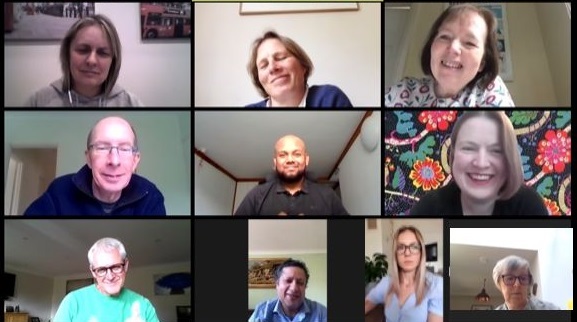Peter Smallbone, 46, from Birmingham was diagnosed with a glioblastoma brain tumour in April. He had been having headaches for a couple of weeks which his GP said were likely to be stress-related. Peter was told to get back in touch should he have any other symptoms such as vomiting.
Then, on Easter Saturday, Peter was feeling dizzy so he went for a lie-down at home. The next thing he remembers is waking up on Easter Monday at the Queen Elizabeth Hospital in Birmingham.
His wife had called an ambulance when she couldn’t rouse him from a sleep a couple of hours after Peter had gone to rest. CT and MRI scans had found a large tumour on Peter’s brain and he had emergency surgery on Easter Sunday which removed around 90% of it.
Peter said: “I have no memory of what happened to me at all. It was all so sudden and very quick. Work had been pretty full-on but no more than usual so I had accepted the doctor’s diagnosis of stress without any disagreement. I certainly didn’t ever think that I might have a brain tumour.”
Peter was in hospital for five days and credits the medical team for carrying out the surgery as urgently as they did on Easter Sunday. He was discharged five days later following assessments from various teams on his wellbeing. This included an appointment with occupational therapy where he was asked to demonstrate that he could safely make a bacon sandwich in a mock-up kitchen at the hospital.
He praised his radiographer and neuro-oncology consultant for being knowledgeable and professional with a positive bedside manner as well as his CNS who has been readily available to answer any questions he had following his diagnosis and throughout his ongoing treatment.
He added: “I really can’t fault any aspect of my treatment, except maybe clerical services being a little slow. I didn’t like the radiotherapy – anyone would find being all alone in the room with your head pinned to the machine and lots of funny noises around you to be unpleasant. It was usually done in the morning which meant I could spend the rest of the day resting which helped with my main symptoms of nausea and tiredness.”
Peter is now supporting The Brain Tumour Charity as part of the organisation’s Involvement Network. This gives people who have been affected by a brain tumour the opportunity to help inform all aspects of the Charity’s work. He first found out about the Charity at the cancer centre at the hospital and has since used some of its closed Facebook groups to offer help, support and advice too.
He has found that his degree in Biology has helped him to understand some of the key concepts, such as DNA methylation, which impact on his condition when having conversations with the medical teams looking after him and reading various research papers in his own time.
Peter added: “As a former Biologist, I find the science of my diagnosis and the research funded by The Brain Tumour Charity very interesting. I feel that explaining my own journey as a patient and contributing to how researchers write for people affected could aid both researchers and other people who have been diagnosed with a brain tumour.”
Peter is now coming to the end of his course of chemotherapy and his condition will then be monitored with regular scans. He continues to look after his two young children around the limitations brought about by having to surrender his driving licence. He is also having a phased return to work as an IT Consultant.
Peter added: “My tumour was quite large – around the size of a small orange – but my consultant thinks it may have been growing for only a few months when it was discovered. My family and I were so very shocked but they have really rallied around and been amazing ever since I first went into hospital at Easter.
“Now, I find that I have good days and bad days and, no matter which day you’re having, I think that it is so important to keep your family and friends around you.”

Want to help?
You can share your experiences of being affected by a brain tumour to inform our work.
